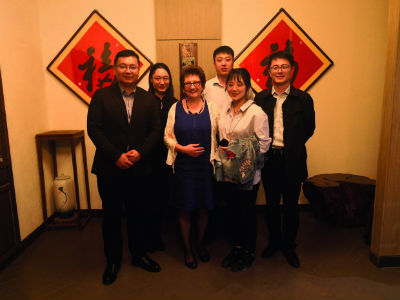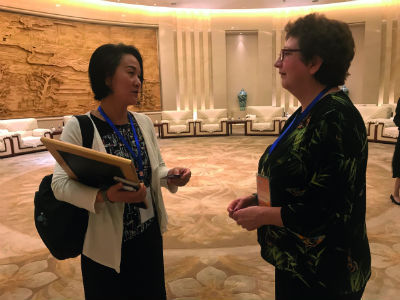Main content

By Dr Barbara Sharp, Policy and Practice Advisor, Alzheimer Scotland
At the invitation of the Chinese Geratric Society (CGS) I attended the 2018 Congress of Chinese Geriatrics and Technical Innovation, held in Taiyuan, Shanxi province, China. As in other parts of the world, China is concerned about providing optimal care to its increasing older population but it has some very specific challenges. It is the world’s most populous country with a major pension shortfall and the number of citizens over 60 years expected to peak at 487 million (nearly 35% of population) around 2050. The most rapid increase is in number of people over 80 years. Although the country’s one child policy ended in 2016, the birth rate has dropped and families remain the main source of support for older people experiencing long term conditions. Care generally is medically oriented with little in the way of a trained or qualified workforce beyond doctors and nurses.
My hosts were the Palliative Care Chapter of the CGS and it was on the topic of palliative care in dementia that I was invited to address the Congress. There is growing appreciation of the value of a palliative care approach at an early stage on being diagnosed with a life limiting illness and in conditions other than cancer. I was totally reliant on my interpreter, a 23 year old oncology nurse called Huiya, as very few delegates or local inhabitants spoke English. There were no simultaneous translation facilities so I sent my script to Huiya well ahead of the Congress to give her time to work on it and we polished it together on my arrival in China. I focused on our policies and practice in Scotland and the thinking behind them, and feedback from the presentation was very positive. I was advised that much I had described was new to the Geriatricians and they seemed keen to maintain contact and nurture further knowledge exchange opportunities.

Across the course of my six-day visit, my interpreter Huiya ushered me to a series of meetings with medical teams – most associated with eating! Her guidance was invaluable - especially (being vegetarian) about what I could eat! As the focus of the Congress was not specifically on dementia I was immensely grateful to her for the opportunity to discuss support for people with dementia in China from a family perspective (her grandmother has dementia).
I was incredibly well looked after by the host team and the CGS presented me with an award, alongside the small number of other speakers from outside China. This reinforced the desire to maintain connections and involved attending a very grand ceremony to receive a certificate electing me as an ‘International Academic Consultant’ – rather a grand title but the sentiment was much appreciated. CGS also sent me home with a £500 donation, towards the work of Alzheimer Scotland.
I’d be happy to discuss more details of my trip and perspectives gained. You can contact me at [email protected]
Scotland is a world-leader in approaches to dementia policy, campaigning and practice. Alzheimer Scotland welcomes international visits to allow us to share the expertise and knowledge we have. Find out about our International Knowledge Exchange.

